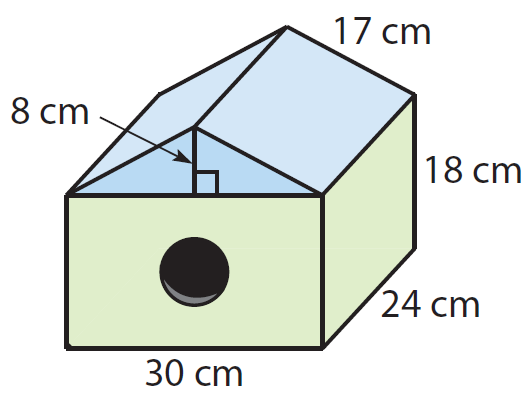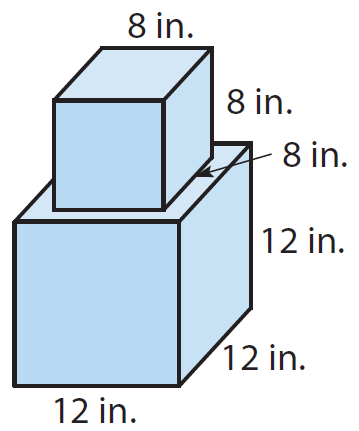SURFACE AREA OF A COMPOSITE SOLID WORKSHEET
Subscribe to our ▶️ YouTube channel 🔴 for the latest videos, updates, and tips.
Problem 1 :
Daniel built the birdhouse shown below. What was the surface area of the birdhouse before the hole was drilled ?
Problem 2 :
Dara is building a plant stand shown below. She wants to stain the plant stand, except for the bottom of the larger prism. Find the surface area of the part of the plant stand she will stain.

Detailed Answer Key
Problem 1 :
Daniel built the birdhouse shown below. What was the surface area of the birdhouse before the hole was drilled ?

Solution :
Step 1 :
Identify the important information.
• The top is a triangular prism with h = 24 cm. The base is a triangle with height 8 cm and base 30 cm.
• The bottom is a rectangular prism with h = 18 cm. The base is a 30 cm by 24 cm rectangle.
• One face of each prism is not on the surface of the figure.
Step 2 :
Find the surface area of each prism.
Add the areas. Subtract the areas of the parts not on the surface.
Step 3 :
Find the area of the triangular prism.
Perimeter = 17 + 17 + 30 = 64 cm
Base area = (1/2)(30)(8) = 120 sq.cm
Surface area = Ph + 2B
Surface area = 64(24) + 2(120)
Surface area = 1,776 sq.cm
Step 4 :
Find the area of the rectangular prism.
Perimeter = 2(30) + 2(24) = 108 cm
Base area = 30(24) = 720 sq.cm
Surface area = Ph + 2B
Surface area = 108(18) + 2(720)
Surface area = 3,384 sq.cm
Step 5 :
Add. Then subtract twice the areas of the parts not on the surface.
Surface area = 1,776 + 3,384 - 2(720) = 3,720 sq.cm
The surface area before the hole was drilled was 3,720 sq.cm.
Problem 2 :
Dara is building a plant stand shown below. She wants to stain the plant stand, except for the bottom of the larger prism. Find the surface area of the part of the plant stand she will stain.

Solution :
Step 1 :
Identify the important information.
• The top is a cube with side length of 8 in.
• The bottom is a cube with side length of 12 in.
Step 2 :
Find the surface area of each prism.
Add the areas. Subtract the areas of the parts not on the surface.
Step 3 :
Find the surface area of the cube which is at the top.
Surface area = 6a²
Surface area = 6(8)²
Surface area = 6(64)
Surface area = 384 sq.in
Step 4 :
Find the surface area of the cube which is at the bottom.
Surface area = 6a²
Surface area = 6(12)²
Surface area = 6(144)
Surface area = 864 sq.in
Step 5 :
Add. Then subtract the areas of the two parts not on the surface.
Required surface area is
= 384 + 864 - 144 - 64 - 64
= 976 sq.in
The surface area of the part of the plant stand she will stain is 976 sq.in.
Subscribe to our ▶️ YouTube channel 🔴 for the latest videos, updates, and tips.
Kindly mail your feedback to v4formath@gmail.com
We always appreciate your feedback.
About Us | Contact Us | Privacy Policy
©All rights reserved. onlinemath4all.com

Recent Articles
-
Simplifying Square Roots Worksheet
Feb 10, 26 07:29 AM
Simplifying Square Roots Worksheet -
Simplifying Square Roots
Feb 10, 26 07:26 AM
Simplifying Square Roots - Concept - Solved Questions -
GMAT Quantitative Reasoning Questions and Answers
Feb 10, 26 06:09 AM
GMAT Quantitative Reasoning Questions and Answers
